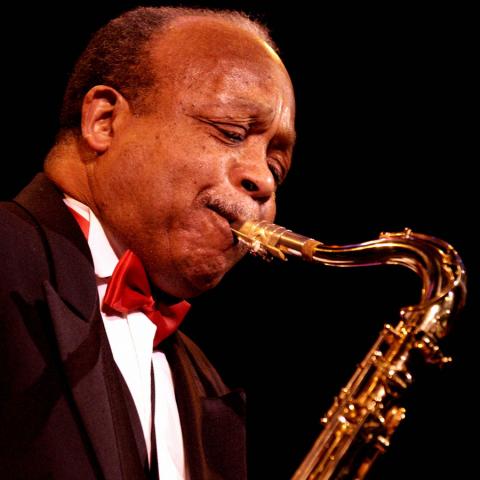Faculty Profile: Andy McGhee

Professor Emeritus Andy McGhee
Phil Farnsworth
Seated in his office at the 1140 Boylston Street building, Professor Emeritus Andy McGhee takes out a faded, crumbling piece of yellowed paper. It’s a telegram addressed to the saxophonist that reads, “Please call PL1-7070, Area code 212 regarding your availability for Count Basie Orchestra.”
This telegram, which the fit, 78-year-old McGhee intends to finally frame, is part of his lore. See, he had always recalled it arriving as early as 1965, before he changed course, moving off the road with the likes of Lionel Hampton and Woody Herman and taking up residence to teach at what was then Berklee School of Music. But examining it again reveals that the missive came late in 1966, and so after handling a couple of smaller local teaching gigs, McGhee was already at Berklee when the offer for the prestigious road gig with Basie came in. But McGhee elected to stay put.
Biggest decision of his life? “Oh, yeah,’’ says McGhee, clad in his trademark sweater on this cold January day. “I had a family, two daughters, and a wife. These were terrible times with the busing in Boston. My family lived in West Roxbury, and it was time for me to stay home.”
McGhee was part of a small crew of teaching musicians at Berklee, and he sometimes taught 35 hours a week. McGhee praises Berklee founder Larry Berk as “someone who cared for you as a musician and as a human being.” He recalls Berk asking him if he rented his house and advising him to buy rather than throw money out the window. “Larry was a good businessperson who had a passion for music,” says McGhee. “He was interested in ways I could make some money.” Berk also encouraged McGhee to write educational books.
At 17, McGhee came to Boston from North Carolina in 1945 to study at New England Conservatory of Music. This temporarily spared him from serving in the Armed Forces but in 1949, a year after his graduation, he was drafted. He played with the U.S. Army training band in New Jersey and later spent six months in Korea. He married his wife, Constance, in 1950 and returned to Boston in 1952 to play with a variety of outfits—sometimes seven nights a week—working primarily with a group led by Fat Man Robinson. From there, it was on to the Lionel Hampton and Woody Herman bands. “The best part about playing with Lionel,” says McGhee, “was that he taught me that once you came to the bandstand, you played your best whether there were 50,000 or five people out there.”
McGhee says that Woody Herman heard him play eight bars and decided to bring him into his band. He did not consider race an issue, which unfortunately it often was back then. Herman, in fact, told McGhee (the only African American in his band at the time) that if he encountered any racial issues when they were on the road, he should bring them to his attention. There were only two times it happened, and Herman dealt promptly with the issues on both occasions.
Asked to recall some of his students at Berklee, McGhee mentions Greg Osby, Javon Jackson, Bill Pierce, Matt Marvuglio, Jaleel Shaw, Walter Beasley, Antonio Hart, Tim Price, Ralph Moore, and others. “There are so many,” he says. “I’m proud of them all.” McGhee has kept a few letters from former students, including one from Tim Price thanking him for “kicking my backside.’’
When McGhee, who also plays flute and clarinet, came to Berklee, he joined a prestigious staff of horn players-turned-teachers. McGhee taught full time for 33 years, now he teaches only on Tuesdays for six hours, directing one ensemble and teaching private lessons to eight students.
The highlight of McGhee’s nonteaching career may well be The Golden Men of Jazz tour he did with Hampton, Harry “Sweets” Edison, Clark Terry, Benny Bailey, Al Grey, and Benny Golson in the early 1990s. “It was mellow, relaxed, no headaches. We flew first class, and we made some money,” he recalls.
These days, music remains the main thing for McGhee. “Teaching keeps me up to date and around good players,” he says. “If you’re going to be a teacher and talk about something all day, you gotta be able to do it.”
Even though he’s been a widower since 1986 and his children live out of state, McGhee still enjoys living in Boston, citing the restaurants, the changing seasons, the proximity to the water, the culture, and the good orchestras. He still plays the occasional gig and bemoans hip-hop’s influence on contemporary music. McGhee says he lives a pretty busy—and if I may infer—happy life shifting between golf and jazz.
In commemoration of McGhee’s long and dedicated service to the college and the impact he has had on his students through the years, the Andy McGhee Endowed Scholarship has been established. The fund was kicked off with a $10k gift from Walter Beasley that was matched by a $10k gift from President Roger Brown and his wife Linda Mason. Others have donated as well, bringing the current the total to $60k. Of the scholarship, McGhee says, “I feel honored,” noting that a partial scholarship to New England Conservatory was essential to his own education.
Anyone wishing to contribute can make checks payable to Berklee College of Music with a note designating it for the Andy McGhee fund. Mail checks to David McKay, Berklee College of Music, 1140 Boylston Street, Boston, MA 02215.




